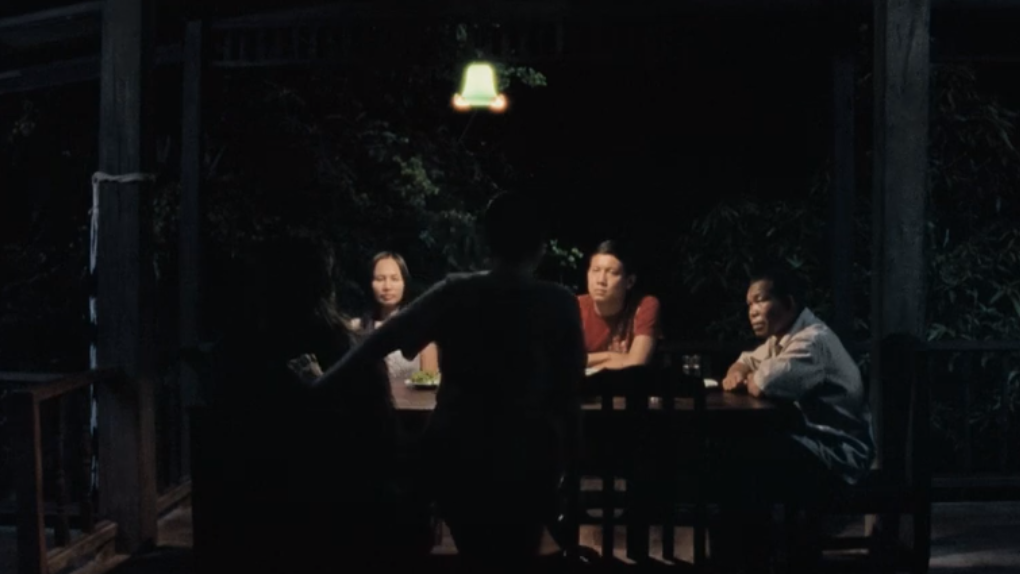Uncle Boonmee Who Can Recall His Past Lives
2010

Rated: NR
Genre: Fantasy, Drama
Country: Thailand
Run-Time: 1h 54min
Director: Apichatpong Weerasethakul
Cast
Thanapat Saisaymar……………Uncle Boonmee
Jenjira Pongpas…………………….Jen
Natthakarn Aphaiwong……..Huay
Jeerasak Kulhong………………….Boonsong
WARNING: This is film recommendation intended for true cinephiles.
I had to think long and hard before adding Uncle Boonmee Who Can Recall His Past Lives to The Midnight Selection. The film includes monkey ghosts with glowing red eyes, but they are not used to create horror. The film also includes graphic footage of a woman being sexually pleasured by a catfish, but it is not meant to be extreme. Instead, Uncle Boonmee Who Can Recall His Past Lives is a subtle, hypnotic fantasy that rests in your sub-conscious begging to be interpreted.
Uncle Boonmee Who Can Recall His Past Lives is a Thai film, directed by experimental, independent filmmaker Apichatpong Weerasethakul. In truth, the film, which is unflinchingly Buddhist in its vision, would had likely fell into obscurity, except with Weerasethakul fans, had it not won a Palme d’Or prize at Cannes. It is a meditative film, containing no easily coherent plot, that capably contemplates heavy ideas surrounding death, regrets, and aging.
When we first meet Uncle Boonmee (Thanapat Saisaymar) he is at his farm house living out his last days. Boonmee suffers from kidney failure and is treated daily by his Laotian assistant Jaai. Living with him is also his sister-in-law, Jen, and his nephew, Jaai. One night, while eating dinner with his family, Boonmee is visited by both the ghost of his dead wife and his estranged son, who now red eyes and hair covering his entire body after mating with a Monkey Ghost.
The rest of the film focuses on showing us Boonmee’s final days, allowing time for one raunchy side story about a princess, a servant and a fish. Boonmee, it would seem, has regrets about his time as a soldier and wishes to use his remaining time to find peace.
Uncle Boonmee Who Can Recall His Past Lives redefines slow burn cinema. It flows like an act of meditation. Endless lengthy takes and a sparse soundtrack challenge you to succumb to its magical, surreal beauty. It took me two sittings to get through the film, and I started it in mid-afternoon. My personal advice would be to have plenty of coffee on hand before viewing. But there is a genuine payoff to Weerasethakul’s subdued style, as the film’s images linger in your head long after its conclusion.
Uncle Boonmee Who Can Recall His Past Lives subverts traditionally horrific elements into something calming and reflective. Do not get me wrong, the surreal happenings can startle at first, but the long takes and character’s matter-of-fact acceptance of events eventually intentionally undermine their punch. In Uncle Boonmee Who Can Recall His Past Lives, the horror, extreme and surrealist elements are simply vehicles to present larger ideas about the human condition. The application of this gentle form of magical realism contrasts sharply with the heavy-handed Freudian psycho-sexual imagery of filmmakers such as Takashi Miiki and David Lynch. In fact, the main reason I started this review with a warning is because I am acutely aware that this type of film will simply be too alien and too inaccessible to be appreciated by everyone. Much like a dream, the film is meant to be experienced before it can be understood and even then, your understanding will be highly personal. (My closest comparison for Uncle Boonmee’s original style would be the film’s of Andrei Tarkovsky.)
So how does a film that is clearly art-house fantasy find its way onto a list comprised mostly of modern horror films? Well, for one thing, I find it remarkable that images and ideas that could produce general fright in a horror film can be transformed so seamlessly into something meditative. But also Uncle Boonmee Who Can Recall His Pat Lives is a film that forces its viewers into seriously contemplate our own mortality, which is, for many of us, the most terrifying thing a film can do.
